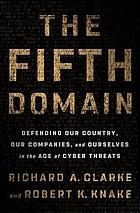
The Fifth Domain
Defending Our Country, Our Companies, and Ourselves in the Age of Cyber Threats
کتاب های مرتبط
- اطلاعات
- نقد و بررسی
- دیدگاه کاربران
نقد و بررسی

June 3, 2019
Clarke and Knake, both cybersecurity consultants and former National Security Council staffers, follow up their 2010 Cyber War with this sobering but hopeful exploration of defenses against the weaponization of the internet. They discuss various hacking menaces to the computer networks that undergird modern life, from credit card fraud to Russian, Iranian, and North Korean military incursions threatening graver damage: ransomware attacks that can put hospitals, drug factories, and shipping firms out of commission; subversion of voting systems that could cause election-day chaos; and commandeering utility computer systems that could destroy electric grids and gas pipelines. The risks are dire but manageable, say the authors, who focus their account on cybersecurity measures at private firms that are waging a complex battle to prevent penetrations, slow and contain hacks, and recover quickly from breaches. (The authors also provide security tips for individuals, including the seldom-heeded “do not use the same password on more than one site.”) Clarke and Knake, drawing on interviews with experts, explain cybersecurity’s intricacies in a lucid, engaging manner that avoids the alarmism that often surrounds the subject. The result is a fine survey that will interest policy makers, executives, and ordinary readers alike. Agent: Andrew Wylie, the Wylie Group.

June 1, 2019
Hacking, cracking, and stealing, whether elections or state secrets or cash--it's all in a day's work for the bad guys who populate the pages of this treatise on electronic security. If you're an individual computer user, you can do things to keep yourself secure like using two-factor authentication and secret password phrases. But what if you're a nation-state? Cybersecurity experts Clarke and Knake (co-authors: Cyber War: The Next Threat to National Security and What To Do About It, 2010, etc.), both of whom logged time inside the cybersecurity arms of presidential administrations, have much to say about the ways in which governments and companies have tried to make themselves safe from the legions of hackers out there, from your ordinary black hats to agents of Russia, China, Iran, North Korea, and other entities. The militaries of those nations in particular are actively working to best our cyberdefenses--as the authors write, "the Russian military has not only used cyber weapons to collect intelligence, but has also employed cyber weapons to damage, disrupt, and destroy physical objects in the real world, beyond the realm of 1s and 0s." Does this mean we're at war? Regardless of the answer, the Russians are bad at covering their tracks--that's how we know. Clarke and Knake survey the landscape: As they note, most governments may be bad at hiding information, but Apple, Amazon, and Microsoft "have security budgets that dwarf the GDP of Palau," and the private sector is likely to be the driver behind any real reform in cybersecurity and subsequent hardening of the fortress. Meanwhile, the authors counsel reassuringly, as companies finally make the transition to more secure systems of transmission, encryption, and data storage, there is hope that the threats of old will one day be a footnote. For the moment, the cost of mounting an attack on a bank is vanishingly small compared to the amount the bank is spending on keeping secure, so those attacks will keep coming. Largely of interest to policymakers and security experts, though with much for the Wired crowd as well.
COPYRIGHT(2019) Kirkus Reviews, ALL RIGHTS RESERVED.

























دیدگاه کاربران